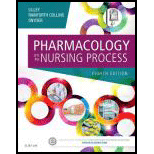
(1)
To determine:
The reason for Person PS’s tiredness.
Case summary:
Person PS is a 68-year-old retired secretary complaining about feeling tired during the day and had trouble sleeping (off and on) for years. She received a prescription for the drug benzodiazepine (alprazolam), which has to be taken as needed for nerves. The nurse discovers that Person PS has been taking alprazolam for 3 weeks every night to get good sleep. However, she complains that even after a good sleep, she is feeling so tired during the day.
(2)
To determine:
The rationale behind the tapering dosage schedule.
Case summary:
Person PS is a 68-year-old retired secretary complaining about feeling tired during the day and had trouble sleeping (off and on) for years. She received a prescription for the drug benzodiazepine (alprazolam), which has to be taken as needed for nerves. The nurse discovers that Person PS has been taking alprazolam for 3 weeks every night to get good sleep. However, she complains that even after a good sleep, she is feeling so tired during the day.
(3)
To determine:
How the drug ramelteon is different from alprazolam.
Case summary:
Person PS is a 68-years-old retired secretary complaining about feeling tired during the day and had trouble sleeping (off and on) for years. She received a prescription for the drug benzodiazepine (alprazolam), which has to be taken as needed for nerves. The nurse discovers that Person PS has been taking alprazolam for 3 weeks every night to get good sleep. However, she complains that even after a good sleep, she is feeling so tired during the day.
(4)
To determine:
The non-pharmacological method to improve Person PS’s sleep.
Case summary:
Person PS is a 68-year-old retired secretary complaining about feeling tired during the day and had trouble sleeping (off and on) for years. She received a prescription for the drug benzodiazepine (alprazolam), which has to be taken as needed for nerves. The nurse discovers that Person PS has been taking alprazolam for 3 weeks every night to get good sleep. However, she complains that even after a good sleep, she is feeling so tired during the day.
Want to see the full answer?
Check out a sample textbook solution
Chapter 12 Solutions
Pharmacology and the Nursing Process, 8e
- what is health assessment?arrow_forwardwhat is health assessment in nursing?arrow_forwardClassroom Learning Objectives: Analyze the basic concept of nutrition (MPO 1.1) Discuss factors that affect food choice (MPO 1.2) Define nutrients and classify nutrients according to their work in the body (MPO 1.2) List the functions of water in the body (MPO 1.1) Describe the best practices for assessing a patient’s nutritional needs (MPO 1.2) Identify lab testing that may be completed to assess a patient’s nutritional status (MPO 1.2) Identify select alterations in nutrition with associated manifestations. Describe the multisystem effects of undernutrition (MPO 1.1) Discern when diet modifications may be warranted (MPO 2.3) Apply therapeutic nursing interventions when an alteration in nutritional status is identified. Explain the basic aspects of reading a food label (MPO 1.2) Describe pharmacological treatments of nutritional needs (MPO 1.3)arrow_forward
- Is this sinus arrest,sinus tachycardia,sinus bradycardia,normal sinus ?arrow_forwardRelated research design to answer the clinical question “How registered nurses accurately measure respiratory rates in performing vital sign assessments in hospital?” Provide article title, purpose/aim, methods and key findingarrow_forwardAnything else I should add to this slide and notes? Can you also put the notes into paragraphs with the changes?arrow_forward
- How are the nervous and musculoskeletal systems interrelated? How do central nervous system abnormalities and damage to the musculoskeletal system affect mobility? Please cite in text source and list referencesarrow_forwardAnything else I should add to this slide and notes? Can you also put the notes into paragraphs with the changes?arrow_forwardAnything else I should add to this slide and notes? Can you also put the notes into paragraphs with the changes?arrow_forward
 Phlebotomy EssentialsNursingISBN:9781451194524Author:Ruth McCall, Cathee M. Tankersley MT(ASCP)Publisher:JONES+BARTLETT PUBLISHERS, INC.
Phlebotomy EssentialsNursingISBN:9781451194524Author:Ruth McCall, Cathee M. Tankersley MT(ASCP)Publisher:JONES+BARTLETT PUBLISHERS, INC. Gould's Pathophysiology for the Health Profession...NursingISBN:9780323414425Author:Robert J Hubert BSPublisher:Saunders
Gould's Pathophysiology for the Health Profession...NursingISBN:9780323414425Author:Robert J Hubert BSPublisher:Saunders Fundamentals Of NursingNursingISBN:9781496362179Author:Taylor, Carol (carol R.), LYNN, Pamela (pamela Barbara), Bartlett, Jennifer L.Publisher:Wolters Kluwer,
Fundamentals Of NursingNursingISBN:9781496362179Author:Taylor, Carol (carol R.), LYNN, Pamela (pamela Barbara), Bartlett, Jennifer L.Publisher:Wolters Kluwer, Fundamentals of Nursing, 9eNursingISBN:9780323327404Author:Patricia A. Potter RN MSN PhD FAAN, Anne Griffin Perry RN EdD FAAN, Patricia Stockert RN BSN MS PhD, Amy Hall RN BSN MS PhD CNEPublisher:Elsevier Science
Fundamentals of Nursing, 9eNursingISBN:9780323327404Author:Patricia A. Potter RN MSN PhD FAAN, Anne Griffin Perry RN EdD FAAN, Patricia Stockert RN BSN MS PhD, Amy Hall RN BSN MS PhD CNEPublisher:Elsevier Science Study Guide for Gould's Pathophysiology for the H...NursingISBN:9780323414142Author:Hubert BS, Robert J; VanMeter PhD, Karin C.Publisher:Saunders
Study Guide for Gould's Pathophysiology for the H...NursingISBN:9780323414142Author:Hubert BS, Robert J; VanMeter PhD, Karin C.Publisher:Saunders Issues and Ethics in the Helping Professions (Min...NursingISBN:9781337406291Author:Gerald Corey, Marianne Schneider Corey, Cindy CoreyPublisher:Cengage Learning
Issues and Ethics in the Helping Professions (Min...NursingISBN:9781337406291Author:Gerald Corey, Marianne Schneider Corey, Cindy CoreyPublisher:Cengage Learning





